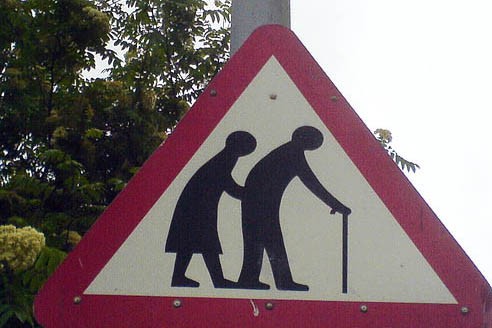
Civic services for the elderly are rarely offered or maintained and they mostly find it difficult to move around

"I am a frequent Metro Bus user and I find it very hard to commute from Model Town to Secretariat. Having a knee problem it is difficult to climb stairs, even elevators are usually not working," says 68-year-old Muhammad Ijaz.
"The government hasn’t taken into consideration old people like me in any of its development schemes, it seems we are just a burden and no one wants to accommodate us," he complains.
The story of Muhammad Ijaz reflects the growing concern for lack of facilities for the elderly in Pakistan. The government has set up special counters for the elderly at major hospitals, airport check points, and railways stations, showing some concern for old people.
Just like services for other special groups, such as the disabled, services for the elderly are rarely maintained.
The number of older people worldwide is growing faster than any other age group. The report, Ageing in the 21st Century: A Celebration and a Challenge, estimates that one in nine people around the world are older than 60.
Ageing is taking place the fastest in developing countries, including those which have a large proportion of young people. Amongst 15 countries with more than 10 million older persons, seven are developing countries, including Pakistan. It is further estimated that there will be over 43 million people (15.8 per cent of the total population ) over 60 in Pakistan by 2050, compared with 11.6 million (6.5 per cent of the total population) at present.
If ageing is to be looked at as a positive concept then it is essential that ample opportunities are provided for the old to stay physically, economically and socially active. The World Health Organisation (WHO) terms this concept as ‘active ageing.’ The concept discusses creating space for older people in society, making it easier for them to function so that they can stay independent.
One aspect of this is economic security. On this front, around 700, 000 government employees receive pension and gratuity schemes. There is also additional enforcement of the Old Age Benefit Scheme for industrial workers, which covers around 1.64 million individuals. Under this scheme, the government has distributed Rs. 7.3 billion amongst 191,000 workers since 1986. The payable pension is also revised to take into account the increased cost of commodities and living.
Another aspect of active ageing is being socially and physically active. This means being able to manage simple tasks on their own. The WHO calls for making cities friendly for old people. It includes various provisions, such as having footpaths wide enough for wheel chairs, development of green spaces or areas where the elderly can come and relax. Another important aspect is the development of special counters in public buildings so they don’t have to wait in long lines.